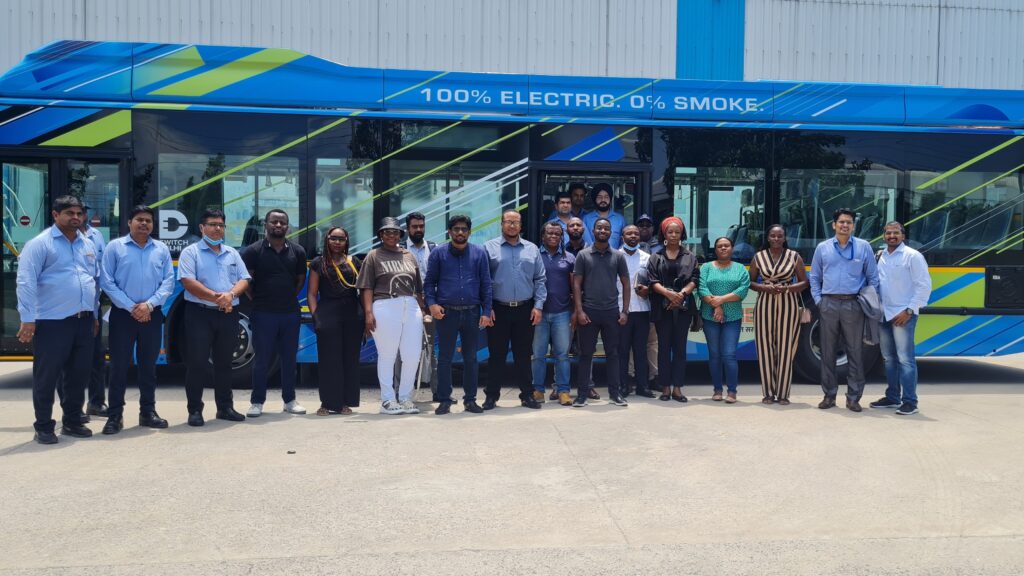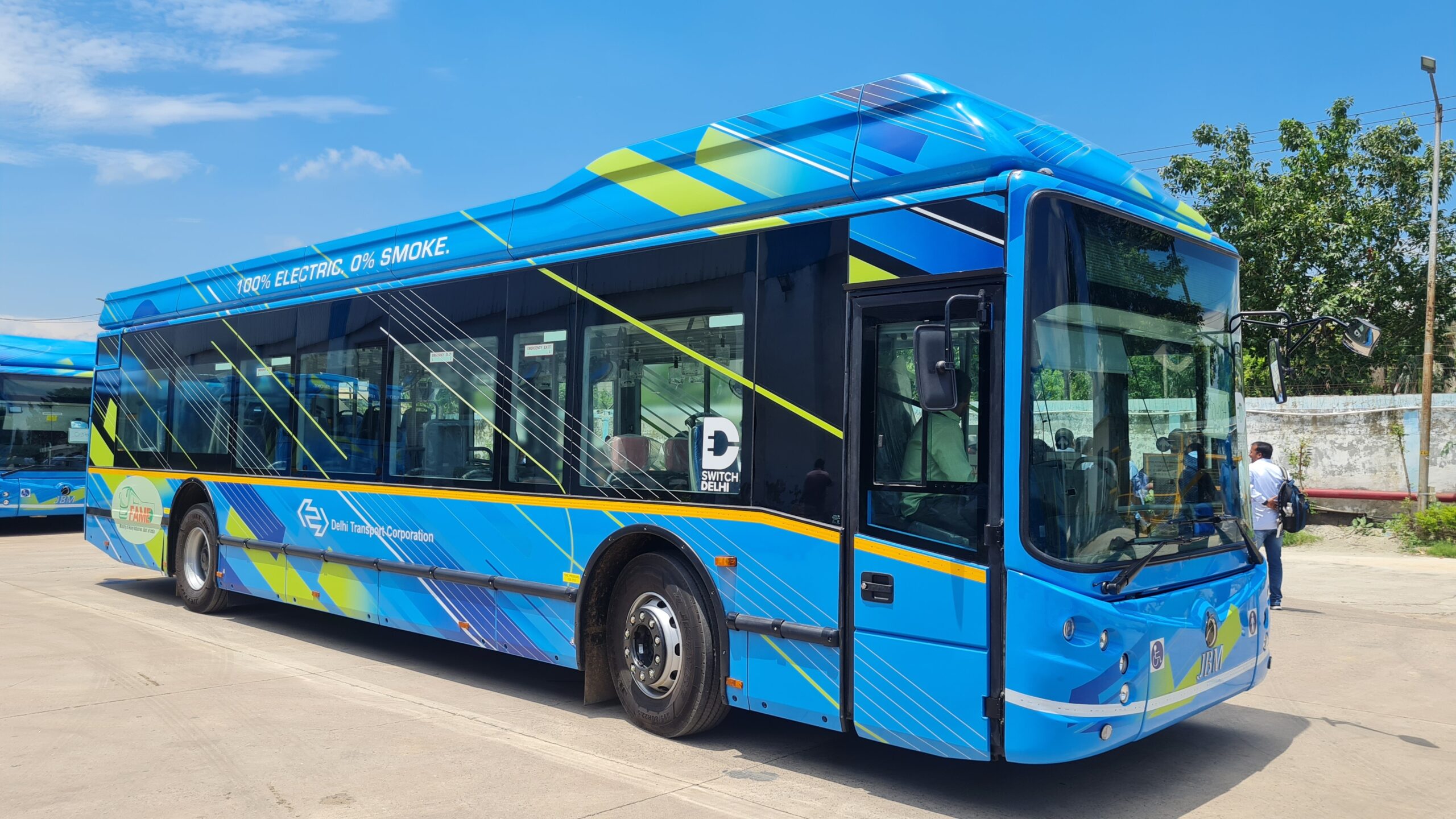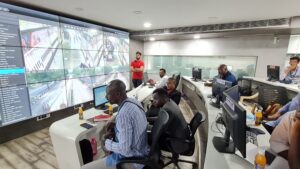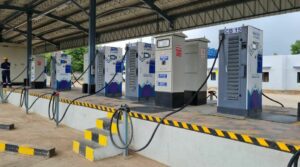For ten days, from 1st to 10th August, city delegates from the African TUMI Deep-Dive cities Nairobi, Durban & Kampala, the TUMI E-Bus Mission City Network city Dar Es Salaam and City delegates from Abidjan and Seychelles came together to participate in a tour through India, visiting the cities of Mumbai, Ahmedabad, Hyderabad, and New-Delhi.
10 Days, 4 Cities, 1 goal: experiencing India’s e-bus operations spectrum.

African Delegates with e-bus manufactured by JBM
The expectations were high: India is pushing ambitious goals in e-bus deployment with 1,900 e-buses across 38 cities as of March 2022 and some striking examples such as Mumbai with the currently largest e-bus fleet of 396 buses (out of 3,583 buses in total) and the aim to fully electrify its bus fleet by 2027.
The African delegates arrived with extensive questions on the e-bus deployment in India. Such as What are major challenges faced when transiting from fossil fuel to electric? How did Indian cities approach the transformation: buying new electric fleets or converting old stock to electric vehicles? Also, Was the public engaged and what are government interventions and institutional frameworks for managing electric public transport operations? Further, insights into the maintenance of e-buses and e-bus infrastructure as well as funding methodologies for the procurement of e-buses were expected.
In-depth discussions were central during the tour with stakeholders of the entire e-bus project planning, procurement and operation spectrum. In Mumbai, the delegation met the Brihanmumbai Municipal Corporation (BMC) to engage on e-bus procurement and contracting models for public transport services and discussed the question of progressive transition to e-buses with the general manager of the Brihanmumbai Electric Supply & Transport (BEST) of the city of Mumbai. One essential highlight was the fact that indigenous OEMs helped to reduce the e-bus adoption cost! Also, the necessity of achieving a just, sustainable, and equitable transport systems was flagged. This includes taking up women empowerment as done by BEST by increasing the number of women drivers and conductors and providing public transport options that consider questions of safety, for example by implementing 136 ladies only buses in the city.
In Ahmedabad, the delegation visited Ahmedabad Janmarg Limited’s (AJL) Bus Rapid Transit (BRT) Command & Control center. BRTs are a key component in mass public transport and Ahmedabad shows an impressive infrastructure on the streets and operational management system in the background. Besides, visits to e-bus depots really gave an impressive picture on charging infrastructure facilitation. In Hyderabad, the Prawaas 3.0 India’s Flagship Passenger Transport Show under the theme “Towards Safe, Smart and Sustainable Passenger Mobility” provided insights into newest technology at the exhibition center and an exclusive exchange with the president of the Bus & Car Operators Confederation of India (BOCI). The last stop in New-Delhi was waiting with discussions with Convergence Energy Services Limited (CESL) and the National Institution of Tranforming India (NITI) Aayog. The conversations here focused on the rollout of the aggregated E-bus procurement model that saw five mega cities take up 5,450 e-buses in 2022 and the upcoming National Electric Bus program that targets to procure around 50,000 buses in India in the next five years.
- AJL Command and Control Centre in Ahmedabad
- Naranpura E-bus charging depot in Ahmedabad
So, there was valuable engagement and exchange over the full period of 10 days. The specific take-aways for our African delegates can be summed-up in four+ key points: 1) Indian cities experienced extensive Government support in the entire process of e-bus deployment 2) National milestones and e-bus targets were set 3) Original Equipment Manufacturers (OEMs) played an active role during procurement process and received support from the authorities 4) Innovative contracting models were seen through which enabled economical financing on all levels in the implementation process. In addition, it became clear that piloting is central to moving forward and federal government prioritizes buses as an important segment when formulating demand incentives for the e-mobility sector. As Mr. Shri Sudhendhu J. Sinha, TUMI E-Bus Mission Ambassador for India from NITI Aayog puts it:
“Electric buses are the best e-mobility ambassadors for the cities”.
Looking at e-bus deployment in the local African contexts, the African delegates are clear on what to focus on when continuing the process of e-bus deployment. Innovative financing mechanisms customized to local circumstances in their cities should be in the center of interventions in moving forward next to the active involvement of African Governments which need to set incentives to trigger e-bus adoption.
And besides all the valuable insights from Indian counterparts, the African city delegates shared experiences from their local city contexts. Such as the journey of e-mobility and renewable energy in Kenya or insights into Uganda’s bold steps towards local production of electric buses. As concluded by Mr. Thami Mayathi from Durban at the final reflection dinner with participation of the German Deputy Head of Economic Cooperation and Development:
“We learned not only from those we have visited, but also from what we have heard from each other”.
The study tour was a learning exchange program organized by the World Resources Institute (WRI) Africa with support from WRI India under the Transformative Urban Mobility Initiative (TUMI) E-Bus Mission in collaboration with, C40 Cities, Deutsche Gesellschaft für Internationale Zusammenarbeit (GIZ) GmbH, Institute for Transportation and Development Policy (ITDP Africa), International Association of Public Transport (UITP), and International Council for Local Environmental Initiatives (ICLEI) on behalf of the German Federal Ministry for Economic Cooperation and Development (BMZ). The TUMI E-Bus Mission supports cities in their transition towards electric bus deployment. Find out more: https://ebus.transformative-mobility.org/


